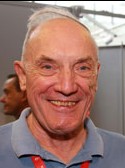- unknown (b.)
Bio/Description
He earned a BSc with Highest Honors in Electrical Engineering from Swarthmore College in 1957, and a Ph.D. in Electrical Engineering from Princeton University in 1961. In 1962 he continued his studies with subsequent post-doctoral work at Imperial College. He is considered to be one of the many fathers of the internet, but he is mainly credited with turning the internet from a government project into something that proved to have scholarly and commercial interest for the rest of the world. He realized before most the potential in the internet and began selling the idea that the internet could have a profound effect on the both the commercial and academic world. For fourteen years he worked as a communications and technology researcher for the United States Army. While working for the Army, he introduced the UNIX operating system to Army labs, which led to the minicomputer ?revolt? within the labs in the early 1980s. Also while working for the Army, he managed a research group that participated in the development of ARPANET, a major technology precursor to the internet. In 1986 he became Division Director for Networking and Communications Research and Infrastructure at the National Science Foundation. In this position he managed the development of a backbone network called NSFNET which interconnected supercomputers from five universities: Princeton; Cornell; the University of California at San Diego; the University of Illinois at Urbana-Champaign; and the University of Pittsburgh. He also managed grants to link the nation's universities together into regional networks that connected to the backbone and so provided universal connectivity to the academic community. The NSFNET was compatible with and connected to the ARPANET network. He also conceived of a joint NSF-DARPA project called the Gigabit Testbed, which was designed to prove the feasibility of IP networking at gigabit speeds. In 1994 he left NSF and joined Cisco and helped with projects such as the Internet2 and Abilene. His career at Cisco began as business development manager for the Academic Research and Technology Initiative program. Here he helped advance the University Research Project (URP) which supports academic research candidates with grants to further networking technology. He was named the interim Vice President and Chief Technology Officer of Internet2 on March 31, 2011. He was the recipient of major awards: In 2002 he was recognized with the Postel Award which is given each year to a person that has made outstanding contributions to the data communications community. The award entails a presentation of a crystal and 20,000 dollars. Upon receiving the award the Internet Society (ISOC) President and CEO Lynn St. Amour said that he had helped transform the Internet from an activity that served the specific goals of the research community to a worldwide enterprise which has energized scholarship and commerce throughout the world. In 1994 the ISOC also recognized him for his courage and leadership in advancing the Internet.
-
Gender:
Male -
Noted For:
Manager of a research group that participated in the development of ARPANET, a major technology precursor to the internet and is credited with turning the Internet from a government project into something that proved to have scholarly and commercial interest for the rest of the world -
Category of Achievement:
-
More Info:


